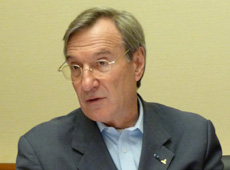Q. What kind of efforts do you make in France to help people understand the importance of space development?

We want to tell our nation that space not only adds to the convenience of our daily lives, but has become a necessity. Effective space utilization is very important not only for the practical things closely related to daily life, such as communications and medical services, but also for protecting the Earth from natural disasters and global warming, which will benefit future generations. The general public's interests vary depending on their age, gender, occupation and so on, but recent trends seem to show that people now want to know not just what we're doing in space but how it is useful in our daily lives. Thus, CNES is making efforts to introduce space to our nation in various forms, including images and publications about space projects, TV programs, exhibitions, and presentations by CNES staff. We think that education is of the utmost importance, so we provide materials for space studies to schoolteachers, who are then able to share the latest knowledge with more than 100,000 students. In recent years, the number of children with a dislike for science has been on the rise in France, so I think it is also important to use space to boost their interest in general science. In addition, we distribute information through CNES's Web site. Our home page gets more than one million unique visitors per year.
Q. The Asia-Pacific Regional Space Agency Forum (APRSAF) was founded in 1993, and since then its member space agencies have been meeting on a regular basis to discuss space utilization and promote international cooperation. What do you think of Asia's efforts to move towards something like ESA?

Manned Mars Exploration Plan under investigation in Europe (Artist's concept, Courtesy of ESA)
I'm very interested in the activities of Asian space agencies represented in the APRSAF. It is easier and more cost-effective to achieve our national goals through international cooperation than by going it alone, so I think it is always necessary for national space policies to include international cooperation. For example, France is investigating a manned Mars exploration project. When French President Nicolas Sarkozy visited the Guyana Space Center last year, he said, "Mars is just a small shiny dot when you look up at the sky. When we eventually go to Mars and look up at the sky, Earth also will appear as a small shiny dot. Do the borders on such shiny dots have any meaning for us?" I agree with the President's thinking, manned Mars exploration should be promoted as an international project, and I think we should always work toward international cooperation when promoting other space policies as well. For this reason, I expect JAXA to play a leading role as an advanced Asian country in space development.
Q. How do you want to cooperate with JAXA in the future?

Japan and France have been cooperating on space projects for 20 years, through the collaborative development of space parts such as semiconductors for satellites, and cooperative observations of space radiation using the Ocean Surface Topography Mission/Jason-2. We would like to expand such cooperation further. We also want to see JAXA propose more international cooperative projects in the future.
Currently, we are proposing some cooperative projects with JAXA in various fields, such as satellites, rockets, the ISS and planetary exploration. Specifically, we would like to concentrate on making contributions to environmental issues. In recent years, we have developed the capacity to use advanced satellite technologies to conduct physical and scientific measurements of the atmosphere, the oceans and plant distribution. We are anticipating many achievements from JAXA's Greenhouse Gases Observing Satellite Ibuki, which was launched in 2009. The role of these global observation satellites is huge. The data they collect is very important for research on global climate change, and this information can be obtained only from these satellites, which can observe the entire planet. In the future, we would also like to develop a new method of measurement. To maintain the environment on Earth for future generations, we need to stop global warming.
In addition, we want to think about not only Earth's environment, but also the space environment. It is said that there are tens of millions of "space waste" articles, such as used satellites and smaller fragments. Both the ISS and currently operational satellites are in constant danger of collisions with these objects. The issue of space debris has been discussed at the Inter-Agency Space Debris Coordination Committee, which consists of 11 major space agencies from around the world. Last year a working group was founded to recover space debris. We are investigating a method to observe the articles using radar, in order to find them promptly and avoid accidents, but we would like to tackle this issue in cooperation with the world's space agencies, including JAXA, to protect the space environment.